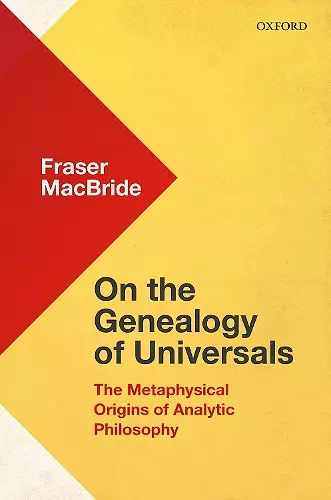On the Genealogy of Universals
The Metaphysical Origins of Analytic Philosophy
Format:Hardback
Publisher:Oxford University Press
Published:15th Mar '18
Currently unavailable, and unfortunately no date known when it will be back

The concepts of particular and universal have become so familiar that their significance has become difficult to discern, like coins that have been passed back and forth too many times, worn smooth so their values can no longer be read. On the Genealogy of Universals seeks to overcome our sense of over-familiarity with these concepts by providing a case study of their evolution during the late 19th century and early 20th century, a study that shows how the history of these concepts is bound up with the origins and development of analytic philosophy itself. Understanding how these concepts were taken up, transfigured and given up by the early analytic philosophers, enables us to recover and reanimate the debate amongst them that otherwise remains Delphic - to interpret some of the early, originating texts of analytic philosophy that have hitherto baffled commentators, including Moore's early papers, to appreciate afresh the neglected contributions of philosophical figures that historians of analytic philosophy have mostly since forgot, including Stout and Whitehead, and to shed new light upon the relationships of Moore to Russell and Russell to Wittgenstein.
Contemporary metaphysicians, whether they are aware of it or not, whether they credit their predecessors or not, frequently end up importing very problematic assumptions from historical debates previously enacted. Unless such assumptions are properly explored and questioned, we cannot feel confident that we are making any genuine progress in contemporary metaphysics rather than just repeating the same mistakes of our philosophical forebears. It is within this context that I find the work of historically minded philosophers to be particularly important. One such philosopher is Fraser MacBride.... an untold and surprising history of how the categories of particulars and universals have been understood in the history of early analytic philosophy * Katarina Perovic, Analysis Reviews *
MacBride succeeds admirably in his main goal * Kevin Klement, Notre Dame Review of Books *
In every one of MacBride's chapters there are striking and challenging contentions; each offers an interpretive perspective that is at least thought-provoking and often illuminating. There is none that does not repay close study... His book is serious and informed. Any student of the period will find that there is a great deal to learn ... from the attempt to view the landscape as he does. * Peter Sullivan, Mind *
When MacBride gets down to the coal-face of textual analysis, some of the most recondite texts of the period, from Moore's early papers-often cited but rarely understood-to the work of Stout and Whitehead, yield to his power of interpretation. They reveal breath-taking philosophical vistas... MacBride's chapter on Ramsey, like the book itself, is a tour de force. * Samuel Lebens, Philosophical Quarterly *
Fraser MacBride's On the Genealogy of Universals is a tour de force through the early years of analytic philosophy with a focus on metaphysics. It is a thorough book, a fascinating book, and a book that is bound to change minds' * David Kaspar, Philosophia *
In the preface to this excellent book, Fraser MacBride says he decided to write it because he had "become convinced that there is far more to ?nd out and far more to learn from the history of early analytic philosophy" (vii). He is right; the history of early analytic philosophy holds insights for us today, and most of them lie outside of what MacBride calls our "cartoon histories." In punchy prose, he mines gems from what one of his heroes, Frank Ramsey, called "that great muddle the theory of universals." * Cheryl Misak, Journal of the History of Philosophy *
ISBN: 9780198811251
Dimensions: 242mm x 164mm x 24mm
Weight: 562g
272 pages